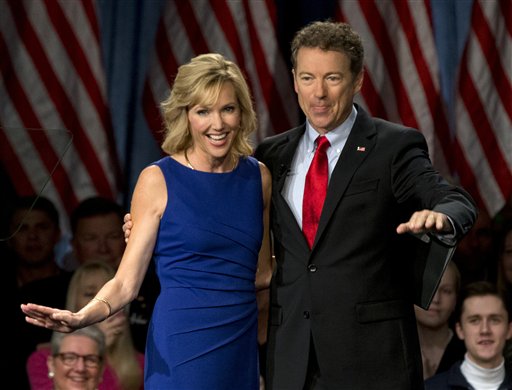
Sen. Rand Paul, R-Ky., joined by his wife Kelley Ashby, arrives to announce the start of his presidential campaign, Tuesday, April 7, 2015, at the Galt House Hotel in Louisville, Ky. AP
LOUISVILLE, Kentucky — Sen. Rand Paul, a favorite of the conservative tea party movement and frequent antagonist of leaders of his own Republican Party, declared Tuesday that he is running for U.S. president “to return our country to the principles of liberty and limited government.”
Paul, a first-term senator from Kentucky, kicked off his White House campaign with a splashy rally in his home state. He begins the 2016 race as the second fully declared candidate, behind Sen. Ted Cruz of Texas, but he could face as many as 20 rivals for the Republican nomination before the primary process starts in January.
“I worry that the opportunity and hope are slipping away for our sons and daughters,” Paul said in a speech that tried to tap into Americans’ deep frustration with Washington. “It seems to me that both parties and the entire political system are to blame.”
Two other Republicans expected to soon enter the race, former Florida Gov. Jeb Bush and Wisconsin Gov. Scott Walker, are considered early front-runners. Whoever becomes the Republican nominee is widely expected to face Hillary Rodham Clinton in the general election. The former secretary of state, who is the heavy favorite for the Democratic nomination, is expected to announce her candidacy in the next two weeks.
It’s unclear how much support Paul can muster in the Republican mainstream. His father, former U.S. Rep. Ron Paul of Texas, unsuccessfully sought the Republican nomination several times, appealing to libertarians who favor limited government and oppose tax increases.
Paul is a frequent contrarian against his party’s orthodoxy, questioning the size of the U.S. military and proposing relaxation of some drug laws that imprison offenders at a high cost to taxpayers. He also challenges Republicans’ support for surveillance programs, drone policies and sanctions on Iran and Cuba.
Tech savvy and youth-focused, Paul is expected to be an Internet juggernaut his competitors will be forced to chase.
His new website left no doubt about his plans, outlining more than a dozen positions on issues he would take if elected president.
After his speech, Paul was set to answer questions from voters on his Facebook page.
Perhaps reflecting the challenges he faces in convincing his critics he deserves the nomination, Paul is also leaving open the door to a second term in the Senate.